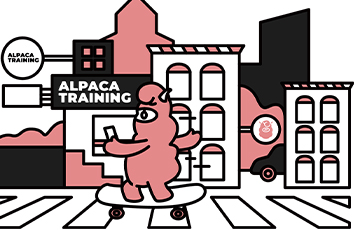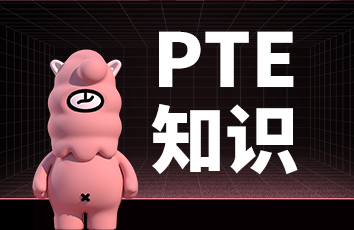今天老师讲解的是PTE写作中的WE题型,它有哪些答题技巧?下面是一个例题:Formal written examinations,文章从思考题目问法和答题方向、抓关键词发展词伙、利用关键词和词伙想出不同角度的观点进行造句。接下来我们一起看看这类题型到底有哪些技巧吧,相信看完后你会有所收获。
原题:
问法一:Many education systems assess students using formal written examinations. Those kinds of exams are a valid method. To what extent do you agree or disagree?许多教育系统通过正式的笔试来评估学生。这类考试是有效的方法。你在多大程度上同意或不同意?
问法二:Whether formal written examination can be a valid method to assess students learning. To what extent do you agree or disagree?正式的笔试能否成为评估学生学习的有效方法。你在多大程度上同意或不同意?
问法三:Exams are commonly used in most schools and universities. Some people think exams should be replaced by other forms of assessment. Do you agree or disagree?考试在大多数学校和大学中都很常见。一些人认为考试应该被其他形式的评估所取代。你同意还是不同意?
答案:
Agree同意:
1. Traditional written examinations enable teachers to assess the extent of students' knowledge.传统的笔试使教师能够评估学生的知识程度。
2. Students are forced to demonstrate what they learn from lessons and courses.学生们被迫展示他们从课堂和课程中学到了什么。
3. It is easy for teachers to monitor plagiarism and cheating in a classroom with all students.老师很容易在教室里监控所有学生的抄袭和作弊行为。
Disagree不同意:
1. Some topics cannot be tested by paper, so children may only pay attention to the topics that will be examined.有些题目不能用纸来测试,所以孩子们可能只关注将要测试的题目。
2.These examinations do not train students to think independently, but only cramming.这些考试并没有训练学生独立思考,而只是填鸭式地学习。
3.It cannot assess one's capacity in a comprehensive way.它不能全面地评估一个人的能力。
解析:
第一部分:思考题目
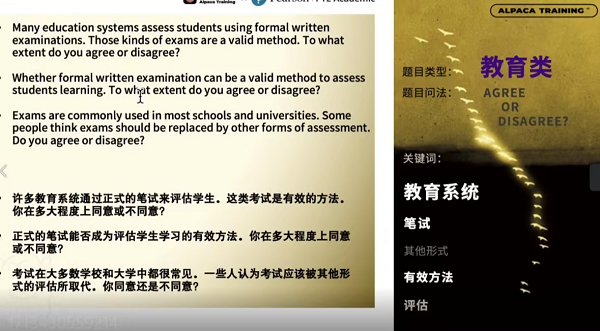
1、今天的大作文的话题是跟教育类型相关的。教育类型是学术考试里头的一个大类,同样的这个问题的问法会有多种多样,但是其实换汤不换药。首先大家可以想一下,教育类型的话题的核心是考察什么?不出意外的话,应该是要讨论素质教育和应试教育的区别。那我们作为学生来说最有发言权了。可以开始飞速的审视一下你们认为的教育的好处和坏处,然后你觉得理想当中的教育类型应该是什么样子。
2、教育类型问法会非常的多。举个例子,只要是看到这种education system或者是written exam, Students learning,School university, 或者是什么assessment类似的这种词,我们都可以把它归类成教育类型的话题,不管问同意不同意,还是说讨论好处和坏处,甚至问有没有什么建议,我们都可以从对比应试教育和素质教育开始。
第二部分:抓关键词发展词伙
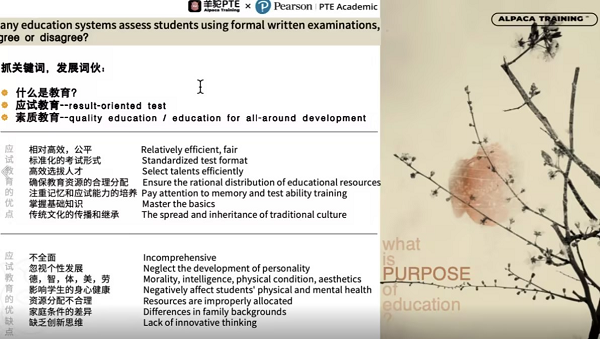
1、题目理解完了之后,我们分散一下词火和观点。首先既然要讨论教育类型,至少我们得要知道什么叫应试教育和素质教育。应试教育可以理解为它是一个结果导向型的考试,result oriented test;素质教育是quality education, 可以把它理解成是全方位发展的一个教育模式。All around the development of the students. 首先我们可以想一想,应试教育的好处和坏处,或者素质教育的好处和坏处。然后我们结合这些词,再想它对我或者是对我的周围,学校,社区,甚至是整个社会,整个国家有什么影响,从小到大这样去分析。
2、应试教育的优点:对学生或者是老师来说是一个最容易的考试,并且比较高效,相对算是公平;可以培养一些掌握基础知识的能力,学生的basic knowledge的储备,我们也可以用the spread and inheritance of the traditional culture, 或是the basic knowledge。缺点:每个同学都会有自己的个性,有personality;每个同学都有自己的talents,一个考试可能看不出来全部。比如说teamwork,或者communication skills。可以积累一些像什么德智体美劳类似的词汇,比如品德,morality,Ethical standard,intelligence。体和劳,physical condition。审美稍微有点难,aesthetics;会给我们造成各种各样的压力,可以说跟mental health或者是跟physical health扯上关系。大家其实可以稍微想一想自己能发挥出来的词火,然后试着自己造句。
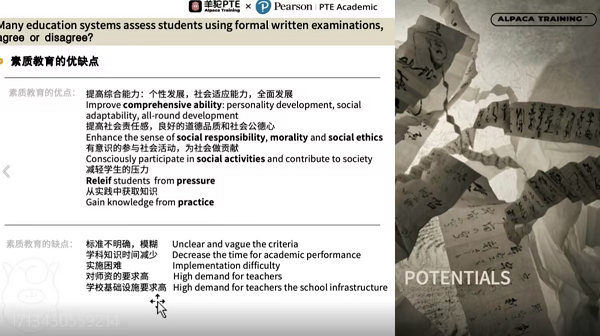
3、素质教育的优缺点。素质教育的优点:素质教育相对来说比较全面一些,well rounded development of students, 或者是Comprehensive abilities compacnities, 这些词都可以;可以帮助我们缓解一些压力,劳逸结合,release the stress pressure,或者是release the stress。素质教育的缺点:标准不明确,对于老师的要求很高,老师的素质和知识储备如果跟不上的话,素质教育就是空谈的,higher demand for, 或者是higher requirements for the teachers,甚至是tutors或者mentors;实施起来的困难程度也大,特别是对于这种人口众多的国家,implementation difficulty。
第三部分:想观点
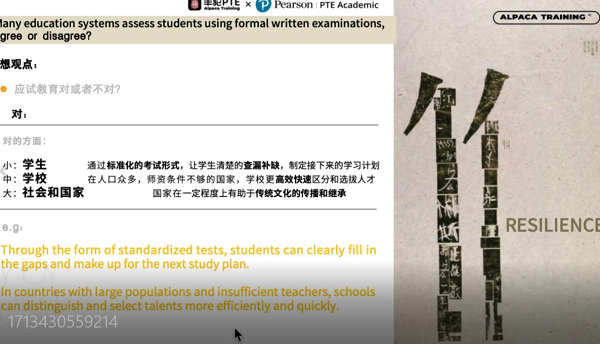
1、应试教育的好处坏处都可以说。好处比如说我知道我的成绩之后,通过这种标准化的考试形式,知道自己接下来可以做什么,针对性的查漏补缺,给自己接下来的学习制定计划,through the form of the standardized tests students can clearly feeling of black feeling of gaps and makeup the next day of plan.
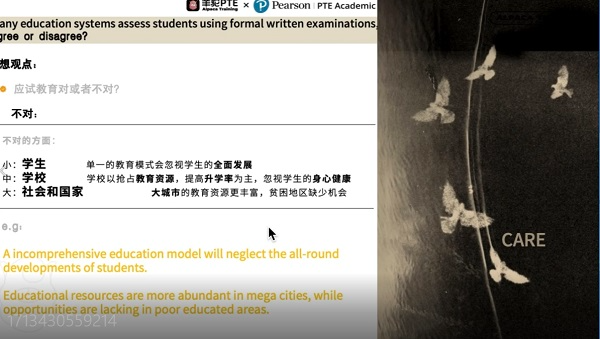
2、 不好的方面,大城市教育资源更丰富,Education resources are more abundant, while opportunities are lacking in poor educated areas, 教育资源缺乏一些的地区,poor educated areas.
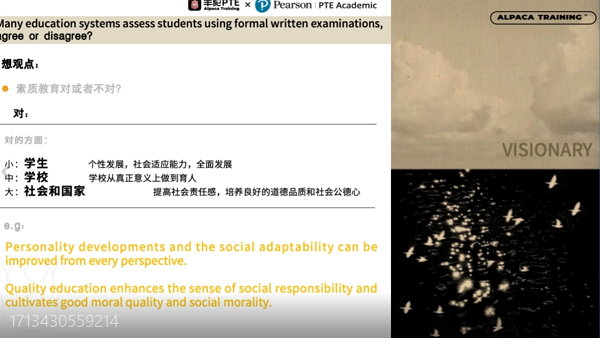
3、素质教育的好处:Personality,Social adapt adaptability,可以用到resilience,也是很好用的,这些能力都可以通过素质教育来提升。
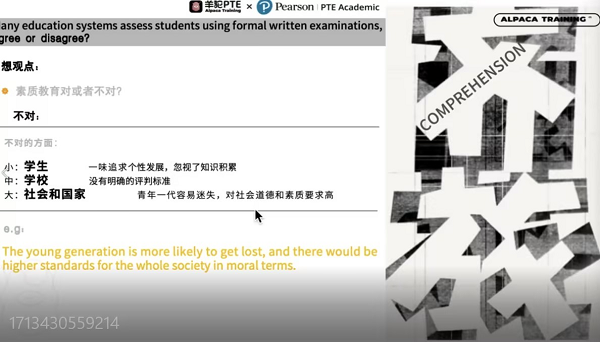
4、素质教育的坏处:对社会和老师的素质要求比较高,我们把它变成一个完整的句子,There will be there will be higher standards, For the whole society, 或者是for mentors for the tutors, In in imoral或immoral terms immoral aspects之类的都行。
综上所述,根据前面的一些词火来想相关的词汇,我觉得这个是最重要的。通过关键词来展开一些词火,然后想观点的时候可以从小到大这样发散,然后好的坏的多角度的去组合。希望大家在造句的时候不要被那种角度给限制了,我们可以换各种各样的表达和句式,然后角度、立场都可以说出不一样的话来。
